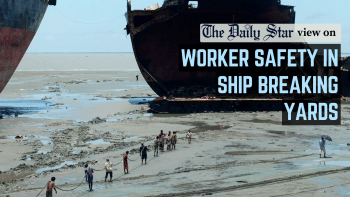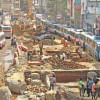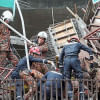Making workplace safe for construction workers

Over the past few years, Bangladesh has experienced a surge in the construction industry as our rapid population growth has necessitated adequate housing for everyone. And that's not all—the government is also implementing dozens of massive projects to improve the country's infrastructure.
In response to these demands, Bangladesh has seen a considerable contribution to its GDP coming from the construction sector, which reflects the industry's significance. According to the data of Bangladesh Bureau of Statistics (BBS), construction added Tk 3.7 lakh crore to the GDP in 2022. This is an increase over the sum for the year 2021—Tk 3.2 lakh crore.
The Labour Force Survey 2017-18 of BBS reveals that the construction industry provides employment for more than 3.4 million individuals or approximately 5.6 percent of the nation's total workforce. But in this bustling panorama of the construction sector, there lies a shadow that often goes unnoticed: the frightening rate of accidents and fatalities suffered by construction workers.
According to a report published by non-governmental organisation Safety and Rights Society (SRS), over 700 fatalities of construction workers, as reported in newspapers, happened across the country between 2017 and 2021. This equates to an annual death toll of 143, on average. Because many fatalities and accidents occur on construction sites in our country every year, the vast majority of them never make it into official records or newspaper headlines.
Based on the report by SRS, in 2021, construction accidents ranked second in terms of workplace fatalities. The transportation sector witnessed the highest deaths among all workplaces, while the manufacturing sector ranked third. While discussions about reducing fatalities have consistently focused on the manufacturing and transportation sectors, the high number of deaths in the construction industry does not receive the attention it deserves.
When it comes to the cause of death in the construction industry, according to the SRS report, between 2017 and 2021, the most common cause of death was a fall from height (245 people), followed by electrocution (223 people), inhaling poisonous gas or suffocation (91 people), wall/mud/roof/stair/earth collapse (78 people), crushed by object (64 people), explosion (two people) and others (nine people). The data suggests that the considerable disregard for safety concerns by construction workers and owners of construction sites is the direct cause of the fatalities.
Safety precautions in construction sites are frequently ignored in Bangladesh since owners, contractors, and workers are often unwilling to ensure them because of carelessness and a lack of understanding, training, and knowledge. If we look at the causes of deaths mentioned above, we can see that the casualties caused by falling from a height, being electrocuted, and breathing in poisonous gas or suffocating could be easily reduced if those in charge of the construction site take some precautions or pay a little more attention to safety.
Some experts may bring up the issue of implementing the Bangladesh National Building Code, 2020 (BNBC), but doing so is not an easy task at the moment. Furthermore, without an efficient regulatory authority throughout the country, BNBC implementation will not be successful. Nevertheless, we cannot wait for such an authority to be established, because the death toll is increasing year after year. Along with pressing the government to establish a regulatory authority for BNBC, we must strive to raise awareness and disseminate knowledge and training among workers and construction site owners about the importance of using safety equipment and taking precautions.
Such awareness must be raised through the combined efforts of the public and private sectors, and worker rights organisations and relevant NGOs must take the initiative to do so. A great example of this can be seen in Bangladesh Legal Aid and Services Trust (BLAST), which has a long history of providing legal aid and assistance to workers. More recently, as part of the "Empowering Workers for Justice" initiative, BLAST has supported construction workers through a variety of initiatives, including raising awareness of construction workers' rights and responsibilities regarding safety and legal protection at workplaces. Such initiatives should be continued as well as broadened by strengthening affiliation with government and other organisations. I believe, with all of our efforts, we may be able to make significant headway to prevent fatalities and injuries from such avoidable causes.
Fahad Bin Siddique is research officer at Bangladesh Legal Aid and Services Trust (BLAST).
Views expressed in this article are the author's own.
Follow The Daily Star Opinion on Facebook for the latest opinions, commentaries and analyses by experts and professionals. To contribute your article or letter to The Daily Star Opinion, see our guidelines for submission.

 For all latest news, follow The Daily Star's Google News channel.
For all latest news, follow The Daily Star's Google News channel. 










Comments